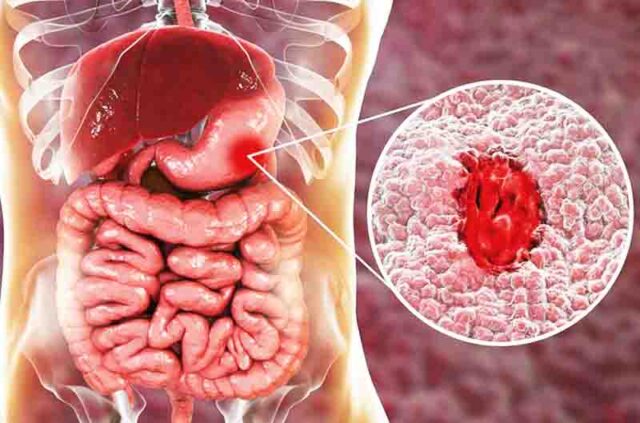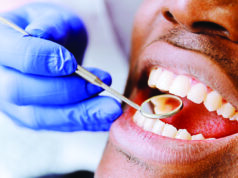By Beatrice Nakibuuka
Peptic ulcers, also known as gastric ulcers, are painful sores in the lining of the stomach or the small intestines.
They occur when the thick layer of mucus that protects the stomach from digestive acids reduces.
This allows the digestive juices to eat away the tissues that line the stomach, thereby causing ulcers.
The commonest cause of ulcers is an infection with the Helicobacter pylori (H.pylori) bacterium.
They can also be caused by long-term usage of nonsteroidal anti-inflammatory drugs like ibuprofen, aspirin and naproxen sodium.
According to Dr Deo Lukyamuzi, a gastroenterologist at Case Hospital, Kampala, it is very important to have a healthy gut, but many times we ignore the signs and symptoms that show there is an underlying problem in the digestive system.
These problems are treated by a specialist doctor known as a gastroenterologist (digestive doctor).
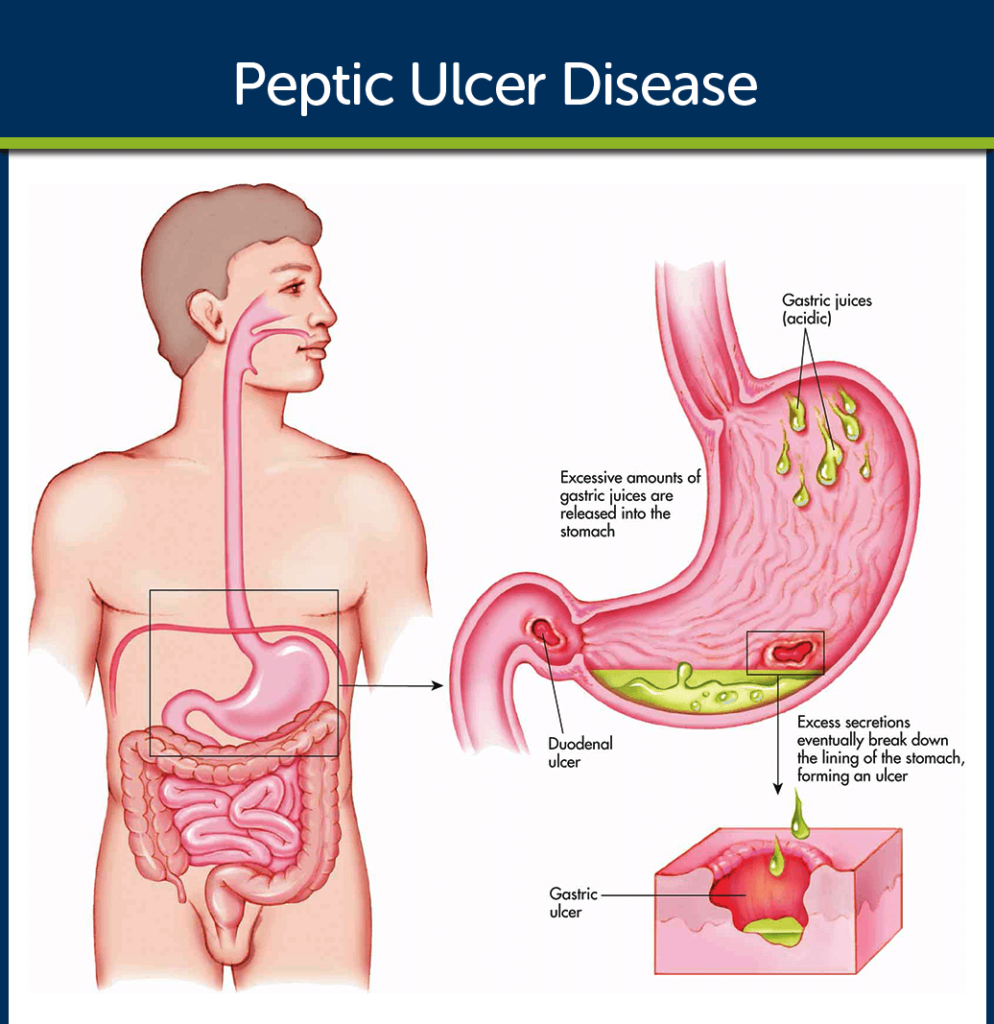
Signs and symptoms
Ulcers can easily be cured, but can become severe if not properly treated.
A number of signs and symptoms are associated with stomach ulcers. Their severity also depends on the severity of the disease.
These may include:
– Chronic burping (belching) may be a symptom of inflammation of the stomach lining infection caused by Helicobacter pylori bacteria.
– Gastroesophageal reflux disease (GERD) is a common warning sign of ulcers that causes the stomach acids to flare back up in the esophagus. -Belching, a sound made by the air in the esophagus may be due to GERD.
– People who have frequent heartburn may be suffering from ulcers.
– Dull pain in the stomach, not wanting to eat because of the pain.
– Nausea, vomiting and bloating.
– Weight loss.
– Difficulty eating and swallowing.
– Bloody stool.
It is important to speak to a doctor about these signs and symptoms however mild they may be because ulcers worsen over time if they are not treated.
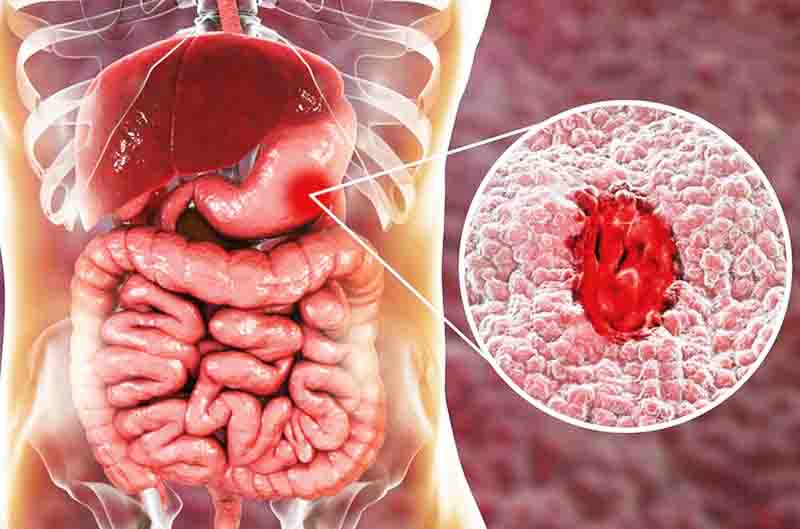
Diagnosis
Dr Lukyamuzi remarks that the diagnosis and treatment for your ulcers depends on the severity of the symptoms.
A doctor may take a review of your medical history and also do physical examination on you to establish whether you may be suffering from peptic ulcers.
These, however, may not give results until the doctor performs some of the following tests:
Presence of H. pylori bacterium can be detected using a blood, stool or breath test.
“The breath test is the most accurate. Here, the doctor will instruct you to drink a clear liquid and blow it into a bag that is sealed thereafter.
“If the bacterium is present, your breath sample will contain higher than normal levels of carbon dioxide,” Dr Lukyamuzi says.
He also recommends that one should inform their doctor before testing if they are taking anti-acid medications because these might give false negative results.
Another way to detect stomach ulcers is by using endoscopy. Here, the doctor passes a hollow tube equipped with a lens (endoscope) down your throat and into your esophagus, stomach and small intestine.
If it detects an ulcer, a small tissue sample (biopsy) may be removed for examination in the laboratory.
A biopsy can also identify whether H. pylori is in your stomach lining.

Treatment
Treatment for peptic ulcers varies depending on the cause. Talk to your doctor to discuss a treatment plan.
If you have an actively bleeding ulcer from the endoscopy, you may be hospitalized for intensive treatment with endoscopy and IV ulcer medications.
You may also require a blood transfusion if you are anaemic.
Surgery, although very rare, may include: the removal of the entire ulcer- taking tissue from another part of the intestines and patching it over the ulcer site, tying off a bleeding artery, cutting off the nerve supply to the stomach to reduce the production of stomach acid.
Usually, treatment will involve killing the H. pylori bacterium if present, and this may be a combination of antibiotics to kill the bacterium.
Dr Lukyamuzi says your stomach ulcer is the result of H. pylori. Antibiotics may be combined with drugs called proton pump inhibitors (PPIs) that block the stomach cells producing acid.
“In addition to these treatments, your doctor may also recommend H2 receptor blockers (drugs that also block acid production which relieves ulcer pain and encourages healing) and stopping use of all NSAIDS,” he says.
Antacids that neutralize stomach acid may be part of the treatment plan.
These provide rapid pain relief, but may cause side effects such as constipation or diarrhea, depending on the main ingredients.
Antacids can provide symptom relief, but generally are not used to heal ulcers.
When one starts treatment, the symptoms of an ulcer may subside quickly, but even if they disappear, continue to take the prescribed medication until the doze is complete.
This is, especially important with H.pylori infections, to make sure all bacteria are eliminated.
Treatment for peptic ulcers is often successful, leading to complete ulcer healing.
But if your symptoms are severe or if they persist despite treatment, your doctor may recommend an endoscopy to rule out other possible causes of your symptoms.
If your ulcers fail to heal, it may be that you did not take your medications according to instructions, you may be smoking or your type of H. pylori is resistant to antibiotics, or you regularly use painkillers. This may, in the long run, cause stomach cancer.
If you have a serious complication from an ulcer, such as acute bleeding or perforation, you may require surgery.
However, surgery is needed far less often now than previously because of the many effective medications available.
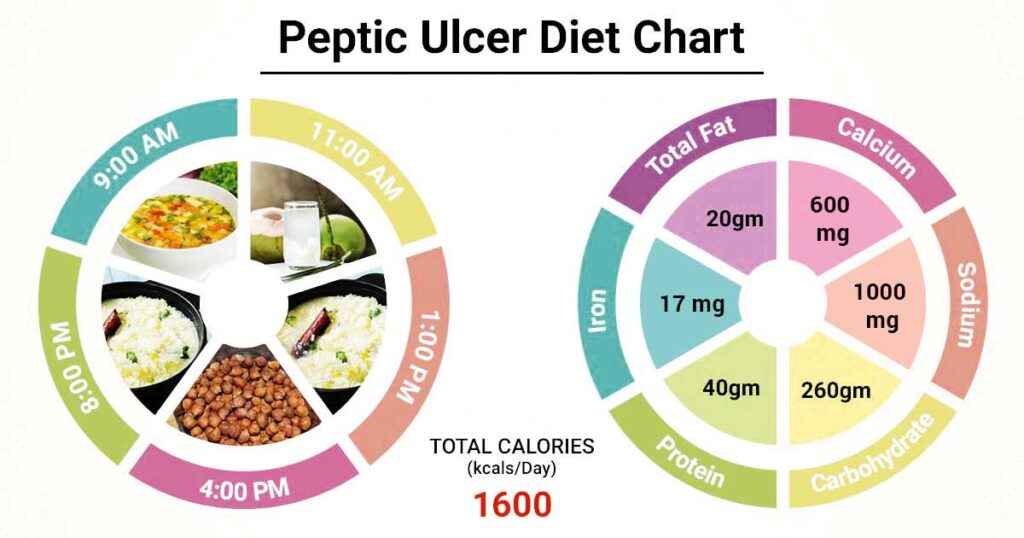
Finding help
According to Dr Lukyamuzi, ulcers are one of the commonest digestive problems and as soon as one is diagnosed with this disorder, it is important that one sees a specialist; gastroenterologist (digestive doctor) to have them treated.
He remarks that ulcers are treatable and curable but their full and complete treatment must take two months and within this time, they must heal.
He warns that if they have not healed, then one must know that they may be suffering from GERD, Hernia, polyps, cancer of the stomach or esophagus and any other tumor in the stomach.
Once the digestive doctor notices stomach ulcers that do not heal, they will immediately do an investigation into any of the above problems.
He says: “Cancer in the stomach can be treated and cured once diagnosed early, but many times people come to us when there is nothing much we can do to treat such cancer.”
He also adds that what usually aggravates ulcers is self-medication which is very common today.
Many people buy over-the-counter medicine to treat ulcers, but end up worsening the condition because they do not know what medicine to exactly take and how long they should take it.
Getting GERD treated is important because over time, the reflux can lead to severe damage to the food pipe.
Dr Lukyamuzi, therefore, recommends that people who have frequent heartburns get proper diagnosis and treatment before this condition worsens.
Lifestyle changes
According to Ivan Philip Baguma, a dietician at Nella Organics, one may get relief if they change their lifestyle.
In the past, it was thought that dieting could cause ulcers, but this is not true.
Therefore, while the foods we eat do not cause or cure stomach ulcers, eating a healthful diet can benefit your intestinal tract and overall health.
“It is a good idea to have a diet with lots of fruits, vegetables, and fiber.
“The foods that may help fight off H. pylori or boost the body’s own healthy bacteria include: broccoli, cauliflower, cabbage, and radishes, leafy greens, such as spinach and kale.
“Probiotic-rich foods, such as yogurt, apples, blueberries, raspberries, strawberries, and blackberries, and olive oil are also good,” Baguma says.
Control stress because it may worsen the signs and symptoms of a peptic ulcer. Consider the sources of stress and do what you can to address the causes.
Some stress is unavoidable, but you can learn to cope with stress with exercise or spending time with friends.
Smoking may interfere with the protective lining of the stomach, making your stomach more susceptible to the development of an ulcer. Smoking also increases stomach acid.
“Excessive use of alcohol can irritate and erode the mucous lining in your stomach and intestines, causing inflammation and bleeding. Limit and if possible or avoid alcohol,” he says.
While certain over-the-counter and alternative medications may be helpful, evidence of their effectiveness is lacking.
Therefore, it is more recommended that you get a prescription from a doctor other than doing self-medication.
















